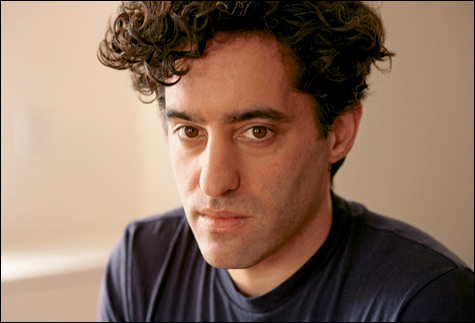
MOURNER: Englander’s depiction of a mother’s suffering has the potency of a pietà. |
The combination of a gift for narrative, a proclivity for pathos, and a lode of arcane knowledge is put to great use in Nathan Englander’s first novel, The Ministry of Special Cases, the long-awaited follow-up to his celebrated 1999 fiction debut, the story collection For the Relief of Unbearable Urges. Kaddish Poznan makes a living obliterating the criminal monikers from gravestones in the cemetery of the Society of the Benevolent Self, where pimps, gangsters, and their molls have found a resting place. In order for the children of Talmud Harry, Shlomo the Pin, and Hezzi Two-Blades to have a respectable existence, evidence of their ancestors’ corruption must be obliterated. Kaddish’s work also enables him to visit the grave of his mother, Favorita the whore.
Kaddish, wife Lillian, and son Pato are living in Buenos Aires when Argentina’s 1976 military coup and its subsequent “Dirty War” begins. On her way to work Lillian sees tanks in the street and notes, “War is not unleashed. It is slowly, it is carefully, installed,” before taking a detour to her job at an insurance company. Pato is too consumed with student rebellion and the Oedipal war against his father to remember to carry his national ID, despite the appearance of checkpoints at all major intersections. “You’re a fascist,” he tells his father when forced to accompany him on a midnight eradication job in the cemetery. “Good for me,” Kaddish answers.

Danger encircles the family. Citizens are grabbed off the street every day by the police, never to be seen again. They become the desaparecidos, the Disappeared, their fate unknown but the worst assumed. “A year before becomes a different life,” Pato and his friends think, watching from a café near the university as a mounted policeman drags a young woman away by her hair.
When Pato is taken, Kaddish and Lillian find themselves unable to navigate the bizarre bureaucracy of the new regime to find him. The policemen, soldiers, and functionaries who keep the killing machine running block their way at every turn. Kaddish, a blunt bruiser of a man, tries to punch, threaten, and shout his way to the truth about his son. Lillian swings between denial and grief, and Englander’s depiction of her suffering has the potency of a pietà. But her arms are empty: there is no sign of Pato. “She accepted then that to others Pato wasn’t, and it was up to her to make it so Pato was. It was as if she were pregnant with a full-grown son.”
Raised as an Orthodox Jew though now secular, Englander shows a scholar’s acumen in his use of names, which evince his characters’ complicated histories and foreshadow their fates. “Pato,” the Spanish word for duck, is also the national sport of Argentina, a kind of polo/tug of war on horseback that once used a duck in a leather bag as its ball. “Lillian” alludes to the prophet Hosea’s words in a time of political unrest when promising to make the shattered Israel bloom like a lily.
And Kaddish? His name is bestowed on him by a rabbi: “Let his name be Kaddish to ward off the angel of death. A trick and a blessing. Let this child be the mourner instead of the mourned.” And so the man who erases memories of the dead is named for the Jewish prayer of mourning that contains neither the name of the departed nor any mention of death at all. The prayer is a memorial built only of words. Implicit in its recitation is the acknowledgment of the responsibility to remember the dead, wherever they are, whoever they are.
NATHAN ENGLANDER | Brookline Booksmith, 270 Harvard St, Brookline | May 2 @ 7 pm | 617.566.6660